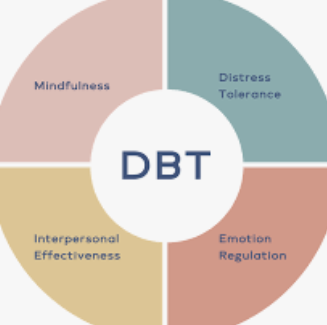Dialectical Behavior Therapy (DBT) is a highly effective form of psychotherapy designed to help individuals manage intense emotions and improve their overall mental health. Originally developed to treat borderline personality disorder (BPD), DBT has since been adapted to address a wide range of mental health conditions, including depression, anxiety, eating disorders, and substance abuse. In this blog post, we will explore what DBT is, how it works, and the benefits it offers.
What is DBT?
DBT is a type of cognitive-behavioral therapy that emphasizes the psychosocial aspects of treatment. The therapy combines traditional cognitive-behavioral techniques with concepts of mindfulness, acceptance, and emotional regulation. The term “dialectical” refers to the integration of opposites, such as acceptance and change, which is a core principle of DBT.
Key Components of DBT
DBT is structured around four key components, each designed to address different aspects of emotional and behavioral regulation:
1. Mindfulness
Mindfulness involves being fully present and aware in the moment, without judgment. It helps individuals develop greater awareness of their thoughts, feelings, and surroundings, which can reduce emotional reactivity and improve decision-making.
2. Distress Tolerance
Distress tolerance skills focus on helping individuals cope with and tolerate intense emotions without resorting to harmful behaviors. Techniques include distraction, self-soothing, and radical acceptance.
3. Emotion Regulation
Emotion regulation skills are designed to help individuals understand and manage their emotions. This includes identifying and labeling emotions, increasing positive emotional experiences, and reducing vulnerability to negative emotions.
4. Interpersonal Effectiveness
Interpersonal effectiveness skills help individuals navigate relationships more effectively. This includes assertiveness training, setting healthy boundaries, and learning how to communicate needs and desires clearly.
The Structure of DBT
DBT typically involves a combination of individual therapy, group skills training, and therapist consultation teams. This multifaceted approach ensures comprehensive support for individuals undergoing treatment.
1. Individual Therapy
In one-on-one sessions, therapists work with clients to address personal challenges and apply DBT skills to real-life situations. The focus is on problem-solving, goal-setting, and developing effective coping strategies.
2. Group Skills Training
Group sessions provide a supportive environment where clients can learn and practice DBT skills. These sessions usually follow a structured curriculum covering the four key components of DBT.
3. Therapist Consultation Teams
DBT therapists participate in regular consultation meetings to support each other, ensure adherence to the DBT model, and discuss challenging cases. This collaborative approach enhances the quality of care provided to clients.
Benefits of DBT
DBT offers numerous benefits for individuals struggling with emotional and behavioral issues. Here are some of the key advantages:
Improved Emotional Regulation
One of the primary benefits of DBT is its effectiveness in helping individuals manage intense emotions. By learning how to identify, understand, and regulate their emotions, clients can reduce emotional volatility and improve their overall emotional health.
Enhanced Coping Skills
DBT equips individuals with practical skills to cope with stress, distress, and difficult situations. These skills can be applied in various contexts, from managing crises to navigating everyday challenges.
Better Relationships
Interpersonal effectiveness training helps clients develop healthier and more satisfying relationships. By learning how to communicate effectively, set boundaries, and assert their needs, individuals can improve their interactions with others.
Reduced Self-Destructive Behaviors
DBT is particularly effective in reducing self-harm and suicidal behaviors. The therapy provides individuals with healthier alternatives for managing distress, reducing the likelihood of engaging in harmful actions.
Increased Mindfulness and Self-Awareness
Mindfulness practices in DBT promote greater self-awareness and present-moment focus. This helps individuals become more attuned to their thoughts and feelings, leading to more deliberate and thoughtful actions.
Support for Various Mental Health Conditions
While DBT was originally developed for BPD, it has proven effective for a range of mental health conditions, including depression, anxiety, eating disorders, and substance abuse. Its adaptability makes it a valuable therapeutic approach for many individuals.
Conclusion
Dialectical Behavior Therapy (DBT) is a powerful and versatile form of therapy that offers significant benefits for individuals struggling with emotional and behavioral challenges. By combining cognitive-behavioral techniques with mindfulness and acceptance practices, DBT provides a comprehensive approach to mental health treatment.
At Kingston & Co Counseling, we are committed to providing effective and compassionate care through DBT and other therapeutic approaches. If you or someone you know could benefit from DBT, please contact us to learn more about our services and schedule an appointment. We are here to support you on your journey to better mental health.







